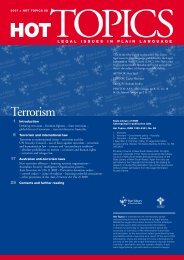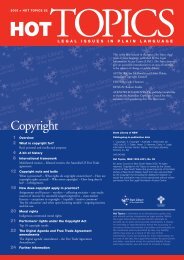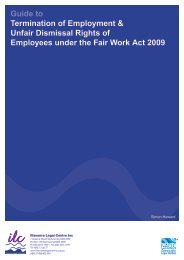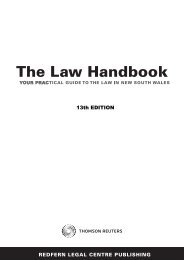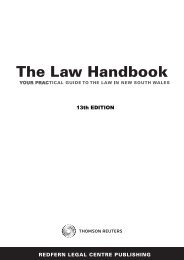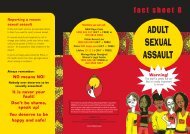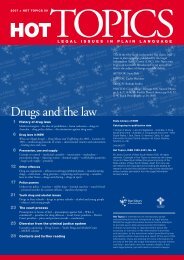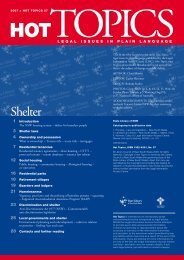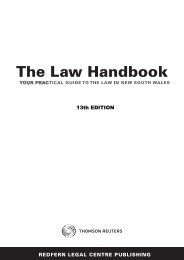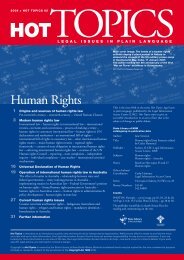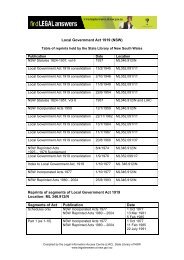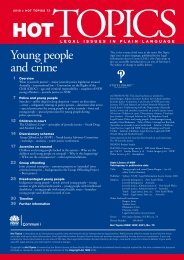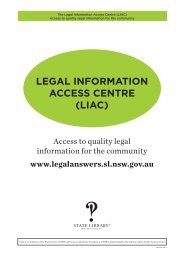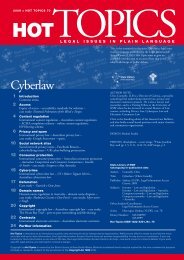Hot Topics 64 - Health and the Law - Legal Information Access Centre
Hot Topics 64 - Health and the Law - Legal Information Access Centre
Hot Topics 64 - Health and the Law - Legal Information Access Centre
Create successful ePaper yourself
Turn your PDF publications into a flip-book with our unique Google optimized e-Paper software.
formulations. This facilitates citizen choice <strong>and</strong> patient<br />
informed consent, as many sunscreen products do not<br />
use nanoparticulate formulations.<br />
Use of sunscreen is only one component of sun safety<br />
– along with use of shade <strong>and</strong> sun protective clothing.<br />
It is important to stress <strong>the</strong> important message that<br />
repeated application of sunscreen can protect against<br />
<strong>the</strong> development of sunburn, photoageing of <strong>the</strong> skin<br />
<strong>and</strong> squamous cell carcinoma precursors. Never<strong>the</strong>less,<br />
realistic appraisal suggests that sunscreen application is<br />
already not an entirely benign act; it may, for example,<br />
increase <strong>the</strong> risk of basal cell carcinoma, with conflicting<br />
results on prevention of melanoma. Such effects may be<br />
<strong>the</strong> result of changed sun exposure behaviour under a<br />
belief of ‘protection’.<br />
ausTralia-us free Trade<br />
agreemenT, BlOOd prOducTs <strong>and</strong><br />
THe pBs<br />
Australia currently has strong claims to being regarded as<br />
self-sufficient in supplies of whole blood. Self sufficiency<br />
in this area is desirable, particularly given increasing<br />
threats of emergent infectious diseases <strong>and</strong> terrorism,<br />
as well as ongoing issues with quality control in remote<br />
locations.<br />
In recent years, increasing imports of plasma-derived<br />
<strong>and</strong> recombinant (artificially produced) products have<br />
occurred (with limited public debate), yet <strong>the</strong> majority<br />
continues to be derived from Australian donations <strong>and</strong><br />
processed in Australia. Whole blood, plasma <strong>and</strong> platelets<br />
from volunteer donors are collected by <strong>the</strong> Australian<br />
Red Cross Blood Service, <strong>and</strong> tested for HIV, hepatitis B<br />
<strong>and</strong> C, HTLV-1 <strong>and</strong> 2, syphilis, <strong>and</strong> for cytomegalovirus<br />
to protect recipients with immune deficiencies. Blood is<br />
a scarce global commodity; paid donors in developing<br />
countries are becoming an increasingly important source<br />
of <strong>the</strong> world’s plasma. Reviews have consistently found<br />
that paid blood donors are more at risk of emergent<br />
infectious disease <strong>and</strong> are more likely to donate in<br />
symptomless ‘window’ periods. In short, blood sourced<br />
from paid ‘donors’ is less safe. CSL Limited is currently<br />
<strong>the</strong> sole provider of plasma fractionation services in<br />
Australia, enjoying exclusive rights under <strong>the</strong> PFA<br />
with <strong>the</strong> Commonwealth Government, due to end in<br />
December 2009. (Plasma fractionation is <strong>the</strong> separation<br />
of plasma into components.)<br />
Australia’s Free Trade Agreement with <strong>the</strong> United<br />
States (AUSFTA) came into force on 1 January 2005.<br />
Chapter 15 of <strong>the</strong> AUSFTA (‘Government Procurement’)<br />
established an obligation that government contracts for<br />
goods <strong>and</strong> services (such as those involved with blood<br />
supply) must be equally open to suppliers in both<br />
countries. A specific annex, however, excluded from<br />
this obligation ‘<strong>the</strong> procurement of plasma fractionation<br />
services’ in Australia.<br />
Never<strong>the</strong>less, in May 2004, <strong>the</strong> United States Trade<br />
Representative <strong>and</strong> <strong>the</strong> Australian Minister for Trade<br />
undertook an exchange of side letters (a binding part of<br />
AUSFTA) on blood products <strong>and</strong> plasma fractionation<br />
services. Central to <strong>the</strong>se obligations is an expiry date<br />
for <strong>the</strong> present contract – <strong>the</strong> Plasma Fractionation<br />
Agreement (PFA) with CSL Ltd – <strong>and</strong> <strong>the</strong> creation of a<br />
review process to consider opening up blood services to<br />
competitive overseas tender. Fortunately <strong>the</strong> Australian<br />
government decided, after consulting with <strong>the</strong> State<br />
governments not to proceed in this direction.<br />
If a large overseas company used its economies of scale<br />
<strong>and</strong> legal expertise with complex procurement documents<br />
to undercut local providers in a tendering process <strong>the</strong>re<br />
could be serious consequences, for example:<br />
> plasma donated in Australia could be shipped<br />
overseas for fractionation <strong>and</strong> <strong>the</strong>n returned. In<br />
such circumstances, thorough cleaning of equipment<br />
between batch runs – though specified in written<br />
guidelines – could not be as rigorously monitored as it<br />
is locally;<br />
> a proportion of Australia’s cheap <strong>and</strong> comparatively<br />
safe blood supply could be siphoned off into overseas<br />
markets, where it would be highly valued as a low risk<br />
product.<br />
Annex 2C of <strong>the</strong> AUSFTA included provisions<br />
establishing a Medicines Working Group comprising high<br />
level officials from both countries. US negotiators to <strong>the</strong><br />
AUSFTA wanted to restrict <strong>the</strong> evidence-based processes<br />
that Australia’s Pharmaceutical Benefits Scheme (PBS)<br />
system used to bargain down <strong>the</strong> cost of new, innovative<br />
image u navailable<br />
Blood donation at <strong>the</strong> Australian Red Cross.<br />
Tamara Dean, Sydney Morning Herald.<br />
Human right to health 21



